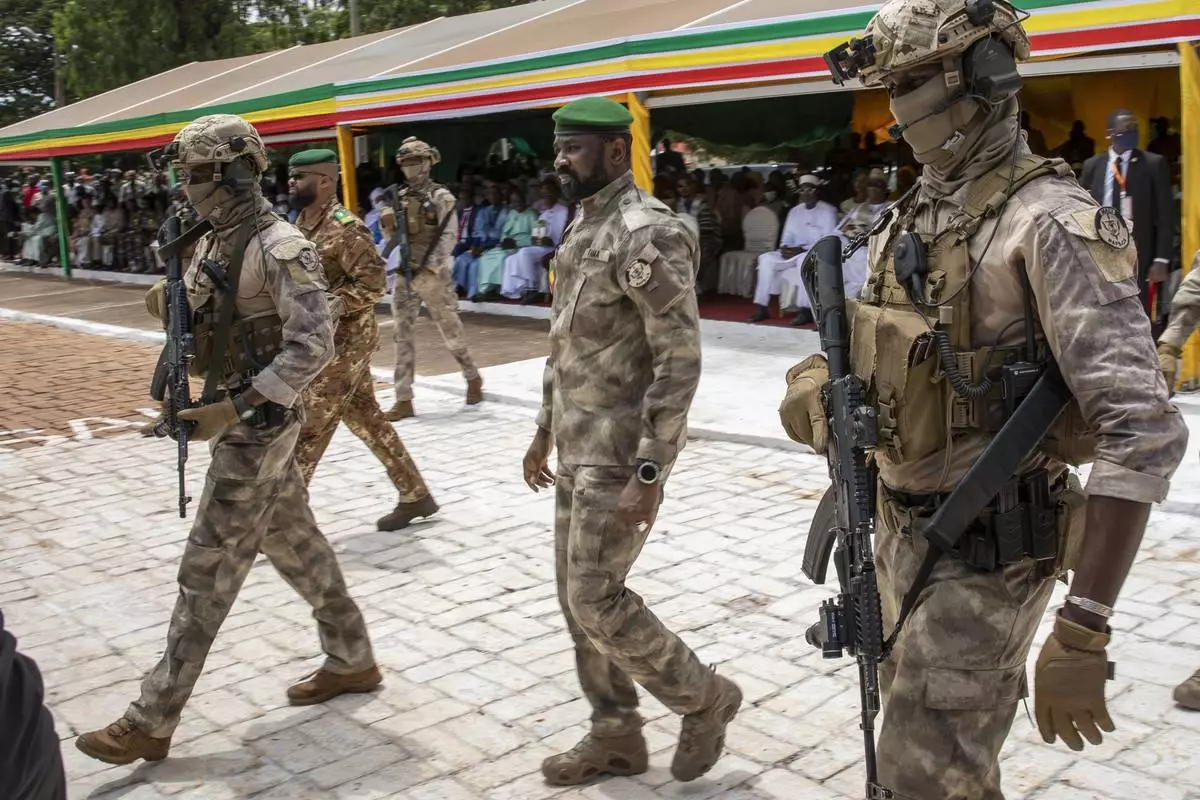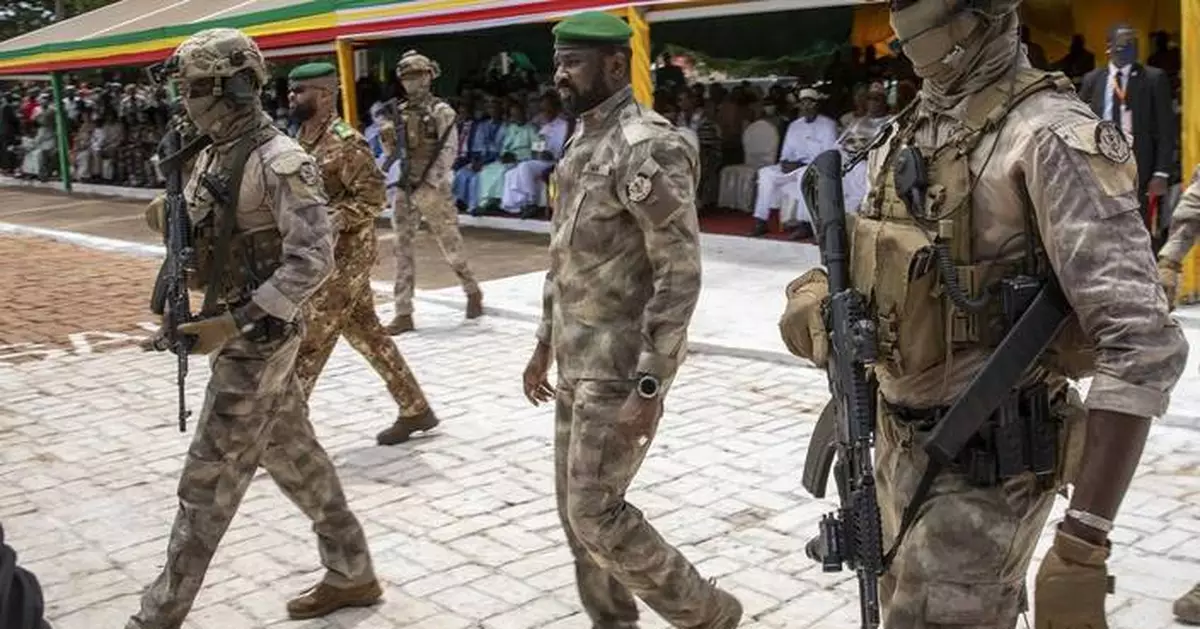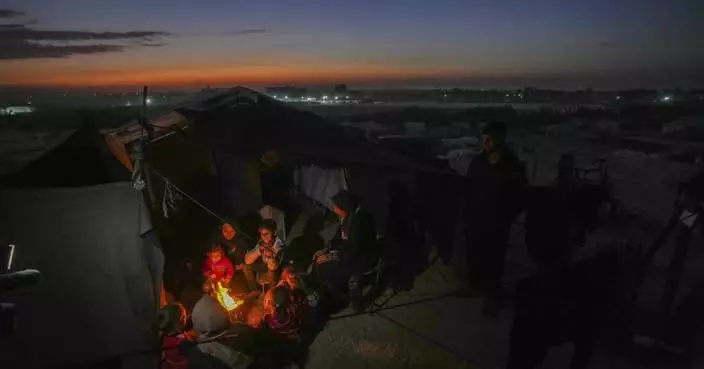BAMAKO, Mali (AP) — Mali troops subdued the Islamic militants who attacked a military training camp and the airport in Mali’s capital Tuesday after gunbattles that killed some soldiers, authorities said. An al-Qaida-linked group claimed the attack.
The militants tried to infiltrate the Faladie military police school in Bamako in a rare attack for the capital before government troops were able to “neutralize” the attackers, army Chief of Staff Oumar Diarra said on national TV, without elaborating.
At least 15 suspects were arrested, a security official who was inside the training camp at the time of the attack told The Associated Press. He spoke on condition of anonymity because he wasn’t authorized to talk to reporters.
“This cowardly and perfidious attack led to some losses of life on the army’s side,” the army said in a statement read on national television in the evening, confirming that trainees at the military training camp were killed but not saying how many.
Mali's army also confirmed the militants targeted the airport, in the statement.
The al-Qaida-linked militant group JNIM claimed responsibility for the attacks on its website Azallaq. Videos posted by JNIM show fighters setting a plane on fire. The group claimed to have inflicted “major human and material losses."
An AP reporter heard two explosions in the area earlier Tuesday and saw smoke rise from a location on the outskirts of the city where the camp and airport are located.
Soon after the attacks, Mali’s authorities closed the airport, with Transport Ministry spokesman Mohamed Ould Mamouni saying flights were suspended because of the exchange of gunfire nearby. The airport reopened later in the day.
The U.S. Embassy in Bamako told its staff to remain at home and stay off the roads.
Mali, along with its neighbors Burkina Faso and Niger, has for more than a decade battled an insurgency fought by armed groups, including some allied with al-Qaida and the Islamic State group. Following military coups in all three nations in recent years, the ruling juntas have expelled French forces and turned to Russian mercenary units for security assistance instead.
Since taking power, Col. Assimi Goita has struggled to stave off jihadi attacks. Attacks in central and northern Mali are increasing. In July, approximately 50 Russian mercenaries in a convoy were killed in an al-Qaida ambush.
Attacks in the capital of Bamako are rare, however.
“I think JNIM wanted to show they can also stage attacks in the south and in the capital, following the battle on the north near the Algeria border where Wagner suffered losses," said Ulf Laessing, head of the Sahel program at the Konrad Adenauer Foundation, which promotes democracy.
In 2022, gunmen struck a Malian army checkpoint about 60 kilometers (40 miles) outside the city, killing at least six people and wounding several others. In 2015, another al-Qaida linked extremist group killed at least 20 people, including one American, during an attack on a hotel in Bamako.
Tuesday’s attack is significant because it showed that JNIM has the ability to stage a large-scale attack, Wassim Nasr, a journalist and senior research fellow at the Soufan Center, told the AP.
It also shows they are concentrating on military targets, rather than random attacks on civilians, he said.
Mednick reported from Goma, Congo, and Banchereau from Dakar, Senegal.

This video grab shows Malian security personnel detaining a man after Mali's army said a military training camp in the capital Bamako has been attacked early Tuesday, Sept. 17 2024. (AP Photo)

FILE - Leader of Mali's ruling junta Lt. Col. Assimi Goita, center, attends an independence day military parade in Bamako, Mali on Sept. 22, 2022. (AP Photo, File)
DUBAI, United Arab Emirates (AP) — Two U.S. Navy pilots were shot down Sunday over the Red Sea in an apparent “friendly fire” incident, the U.S military said, marking the most serious incident to threaten troops in over a year of America targeting Yemen's Houthi rebels.
Both pilots were recovered alive after ejecting from their stricken aircraft, with one suffering minor injuries. But the shootdown underlines just how dangerous the Red Sea corridor has become over the ongoing attacks on shipping by the Iranian-backed Houthis despite U.S. and European military coalitions patrolling the area.
The U.S. military had conducted airstrikes targeting Yemen’s Houthi rebels at the time, though the U.S. military’s Central Command did not elaborate on what their mission was and did not immediately respond to questions from The Associated Press.
The F/A-18 shot down had just flown off the deck of the USS Harry S. Truman aircraft carrier, Central Command said. On Dec. 15, Central Command acknowledged the Truman had entered the Mideast, but hadn't specified that the carrier and its battle group was in the Red Sea.
“The guided missile cruiser USS Gettysburg, which is part of the USS Harry S. Truman Carrier Strike Group, mistakenly fired on and hit the F/A-18,” Central Command said in a statement.
From the military's description, the aircraft shot down was a two-seat F/A-18 Super Hornet fighter jet assigned to the “Red Rippers” of Strike Fighter Squadron 11 out of Naval Air Station Oceana, Virginia.
It wasn't immediately clear how the Gettysburg could mistake an F/A-18 for an enemy aircraft or missile, particularly as ships in a battle group remain linked by both radar and radio communication.
However, Central Command said that warships and aircraft earlier shot down multiple Houthi drones and an anti-ship cruise missile launched by the rebels. Incoming hostile fire from the Houthis has given sailors just seconds to make decisions in the past.
Since the Truman's arrival, the U.S. has stepped up its airstrikes targeting the Houthis and their missile fire into the Red Sea and the surrounding area. However, the presence of an American warship group may spark renewed attacks from the rebels, like what the USS Dwight D. Eisenhower saw earlier this year. That deployment marked what the Navy described as its most intense combat since World War II.
On Saturday night and early Sunday, U.S. warplanes conducted airstrikes that shook Sanaa, the capital of Yemen that the Houthis have held since 2014. Central Command described the strikes as targeting a “missile storage facility” and a “command-and-control facility,” without elaborating.
Houthi-controlled media reported strikes in both Sanaa and around the port city of Hodeida, without offering any casualty or damage information. In Sanaa, strikes appeared particularly targeted at a mountainside known to be home to military installations. The Houthis later acknowledged the aircraft being shot down in the Red Sea.
The Houthis have targeted about 100 merchant vessels with missiles and drones since the Israel-Hamas war in the Gaza Strip started in October 2023 after Hamas’ surprise attack on Israel that killed 1,200 people and saw 250 others taken hostage.
Israel’s grinding offensive in Gaza has killed more than 45,000 Palestinians, local health officials say. The tally doesn’t distinguish between combatants and civilians.
The Houthis have seized one vessel and sunk two in a campaign that has also killed four sailors. Other missiles and drones have either been intercepted by separate U.S.- and European-led coalitions in the Red Sea or failed to reach their targets, which have also included Western military vessels.
The rebels maintain that they target ships linked to Israel, the U.S. or the United Kingdom to force an end to Israel’s campaign against Hamas in Gaza. However, many of the ships attacked have little or no connection to the conflict, including some bound for Iran.
The Houthis also have increasingly targeted Israel itself with drones and missiles, resulting in retaliatory Israeli airstrikes.

The Ticonderoga-class guided-missile cruiser USS Gettysburg (CG 64) steams in the Mediterranean Sea, Dec. 15, 2025. (Kaitlin Young/U.S. Navy via AP)

FILE - Aircraft carrier USS Harry S. Truman is moored near Split, Croatia, Feb. 14, 2022. (AP Photo/Darko Bandic, File)

FILE - A fighter jet maneuvers on the deck of the USS Dwight D. Eisenhower in the Red Sea, June 11, 2024. (AP Photo/Bernat Armangue, File)














